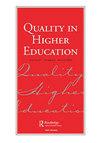Benefits and challenges of cross-border quality assurance in higher education. A case study in engineering education in Europe
IF 1.5
Q3 EDUCATION & EDUCATIONAL RESEARCH
引用次数: 4
Abstract
ABSTRACT Quality assurance in higher education has become a global activity. In the European Higher Education Area, cross-border quality assurance has been heavily encouraged by the European Commission. Behind this, lies the belief that encouraging competition among quality assurance bodies and introducing a liberal ‘market’ logic into the sector would result in a better overall quality of higher education. However, some critical voices have pinpointed possible risks of this practice. This calls for a better understanding of the actual implications of cross-border quality assurance. Using a purposely chosen case study, this article reflects on the risks and benefits of cross-border quality assurance in Europe. The case study involves the accreditation in the engineering sector in Belgium by a French accreditation agency, in partnership with a Belgian agency. Benefits and challenges of cross-border quality assurance are identified, as well as several key lessons for quality assurance bodies involved in this type of activity.高等教育跨境质量保证的好处与挑战。欧洲工程教育的个案研究
高等教育质量保证已成为一项全球性的活动。在欧洲高等教育区,欧盟委员会大力鼓励跨境质量保证。在这背后,他们相信鼓励各质素保证机构之间的竞争,并引入自由的“市场”逻辑,将会提高高等教育的整体质素。然而,一些批评的声音指出了这种做法可能存在的风险。这就要求更好地理解跨境质量保证的实际含义。本文通过一个有意选择的案例研究,反映了欧洲跨境质量保证的风险和收益。该案例研究涉及由一家法国认证机构与一家比利时机构合作对比利时工程部门进行认证。确定了跨境质量保证的好处和挑战,以及参与这类活动的质量保证机构的几个关键经验教训。
本文章由计算机程序翻译,如有差异,请以英文原文为准。
求助全文
约1分钟内获得全文
求助全文
来源期刊

Quality in Higher Education
EDUCATION & EDUCATIONAL RESEARCH-
CiteScore
3.30
自引率
14.30%
发文量
32
期刊介绍:
Quality in Higher Education is aimed at those interested in the theory, practice and policies relating to the control, management and improvement of quality in higher education. The journal is receptive to critical, phenomenological as well as positivistic studies. The journal would like to publish more studies that use hermeneutic, semiotic, ethnographic or dialectical research as well as the more traditional studies based on quantitative surveys and in-depth interviews and focus groups. Papers that have empirical research content are particularly welcome. The editor especially wishes to encourage papers on: reported research results, especially where these assess the impact of quality assurance systems, procedures and methodologies; theoretical analyses of quality and quality initiatives in higher education; comparative evaluation and international aspects of practice and policy with a view to identifying transportable methods, systems and good practice; quality assurance and standards monitoring of transnational higher education; the nature and impact and student feedback; improvements in learning and teaching that impact on quality and standards; links between quality assurance and employability; evaluations of the impact of quality procedures at national level, backed up by research evidence.
 求助内容:
求助内容: 应助结果提醒方式:
应助结果提醒方式:


